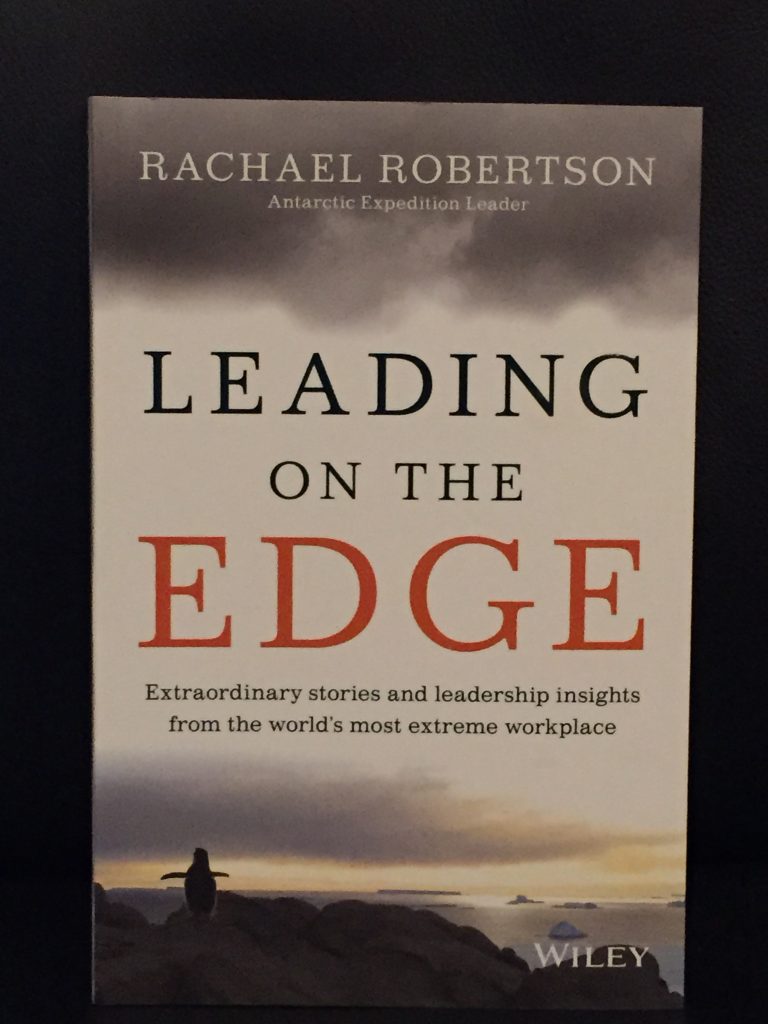Last night I had the opportunity to hear Rachael Robertson, an Antarctic Expedition Leader speak at a Young Professionals evening held by Commerce Ballarat. I must admit as the day wore, a couple of times I did consider cancelling, the thought of heading out after work into our own Ballarat Antarctic Vortex to hear stories of leadership from Antarctica wasn’t a warming thought! I made the effort and attended and definitely wasn’t disappointed. Rachael is one of the best speakers I have heard on leadership, and I’ve heard a few over the years.
Rachael’s genuine, down to earth style, her honesty and ability to openly share her experiences and emotions resulted in an engaged audience. For me, it was one of those presentations that I could have sat and listened to for a lot longer.
To give you some background on Rachael (courtesy of the blurb from the back of her book, Leading on the Edge) Rachael was one of the youngest people to ever lead an Antarctic expedition and one of the first women. In this incredible pressure-cooker environment, Rachael was forced to develop strategies to deal with the isolation, scrutiny and demands of extreme leadership. With no way in and no way out, she had to make it work. It was cold, windy, dark and desolate. And she was stuck with 17 strangers.
Kind of puts our rough day at the office in to perspective doesn’t it?
What I really loved about Rachael’s presentation, other than just hearing her describe the environment that she survived and worked in, while trying to visualise what it must have really been like, was the concepts and strategies that she developed to ensure she was a successful leader in her environment. As I sat there listening and thinking about how her insights and strategies could be applied to my work environment or could have benefited me in previous leadership roles I had been in, they all seemed so easy and common sense to work and live by. Don’t get me wrong, I’m not under estimating how ingenious these insights and strategies are or saying that when implementing them in the workplace there wouldn’t be resistance or challenges. Yet these strategies could be used and applied in the workplace (or in our personal lives) by anyone sitting in that audience last night, regardless of their position in their workplace. Regardless of if they have “manager” in their title.
A key point in Rachael’s presentation was around “everyone can lead without a title.” She shared stories of her experiences in teaching her team to understand this and how sometimes we only think of people as leaders because of the titles they have been given in the workplace. I have certainly seen and experienced this many times in my own career and as a recruiter. I have had managers who haven’t been leaders in my eyes yet because of their manager title they automatically assume they are entitled to being viewed as “the leader.” Leadership doesn’t work like that it my eyes. Being a leader is earnt through the way we conduct ourselves, by the behaviours we demonstrate and what we say and by stepping up and taking action when we see a need or an opportunity to make a difference. Anyone can be a leader. Some people will be naturally better leaders than others but we all have the opportunity to be a leader.
As a recruiter, when interviewing candidates and asking people for examples of when they have demonstrated leadership or taken on a leadership role it never ceases to amaze me how many people respond with something along the lines of “oh I’m not a manager, I’m only the receptionist or the executive assistant or the accountant.” They are only the ……… ?? When I probe these people and dig a bit deeper, in most cases many of them can actually give examples and demonstrate the skills and traits of being a leader in a particular situation yet we have created this mindset that we are not leaders unless we have manager in our title.
And that’s why I found Rachael’s presentation so powerful. Anyone can be a leader regardless of the position or title they have in the workplace. Rachael’s strategies are strategies that can be applied in a team or in an organisation, yet if you don’t yet have the ability to influence at a team or organisation wide level her strategies can be applied by the individual and will go a long way to making people better leaders, building a culture of respect and integrity as well as fostering team work.
I’m feeling pretty inspired after hearing Rachael’s presentation and can’t wait to make a start on her book Leading on the Edge. Her simple yet effective strategies will be applied in our workplace from now on and it’s exciting that we can do this from the ground up as we build the Inspire HQ team and develop our culture. If you ever have the opportunity to hear Rachael speak, I’d highly recommend investing the time, you won’t be disappointed.


